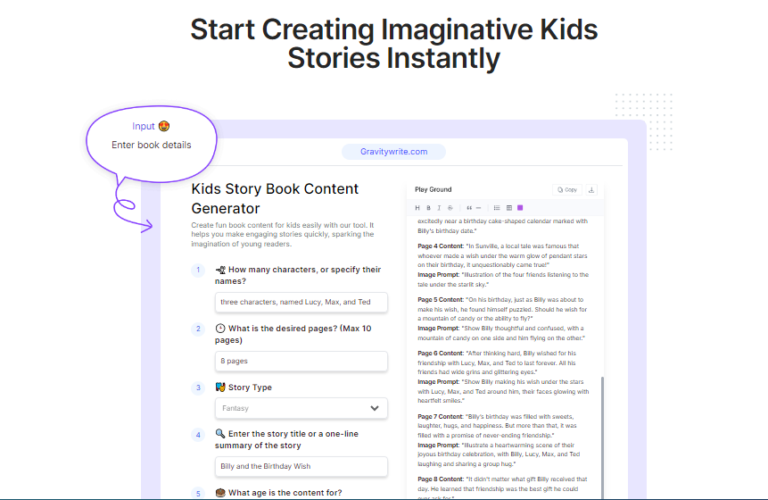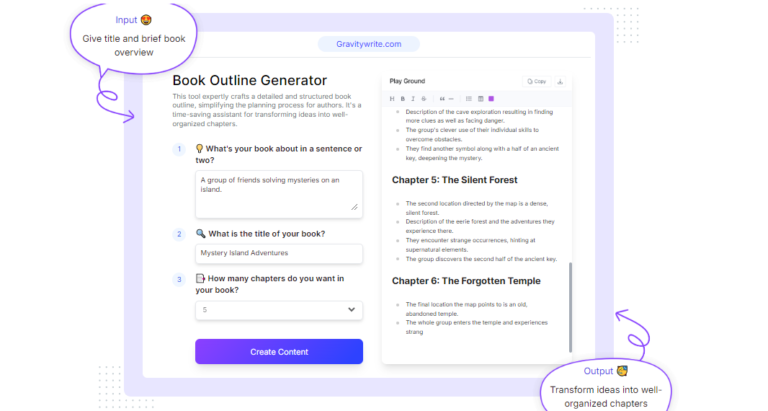Comprehensive guide on how to write a book with no experience, including essential steps, tips, and frequently asked questions. Discover the journey from idea to publication.
Introduction:
Have you ever dreamed of seeing your words in print? Writing a book can be a fulfilling and rewarding experience, even if you’ve never done it before. This comprehensive guide will walk you through the process step-by-step, providing practical advice and encouragement along the way. Whether you’re aspiring to write a novel, a memoir, or a non-fiction book, this article will equip you with the knowledge and tools you need to succeed.
Watch How GravityWrite Creates Books in Seconds!
Get Started With GravityWrite Today!
Finding Your Story
- Identifying Your Passion: What subjects truly ignite your interest and curiosity? Explore your passions to find a topic that will sustain your writing journey.
- Brainstorming Ideas: Let your imagination run wild! Generate a list of potential book ideas by brainstorming, freewriting, or mind mapping.
- Developing Your Concept: Choose an idea that resonates with you and begin to develop it into a well-defined concept. Consider the genre, setting, characters, and plot.
Crafting Your Characters
- Creating Memorable Characters: Give your characters depth and personality by exploring their backgrounds, motivations, and flaws.
- Developing Character Arcs: Plan how your characters will evolve throughout the story. A well-crafted character arc will keep readers engaged.
- Show, Don’t Tell: Use vivid descriptions and dialogue to reveal your characters’ personalities and inner thoughts.
Building Your Plot
- Creating a Compelling Storyline: Structure your story with a clear beginning, middle, and end. Introduce conflict and obstacles to keep readers interested.
- Outlining Your Plot: Organize your story by creating a detailed outline. This will help you stay focused and avoid plot holes.
- Pacing Your Story: Control the tempo of your narrative by varying the length of scenes and the amount of detail.
Writing Your First Draft
- Setting a Writing Schedule: Establish a regular writing routine to maintain momentum. Even small amounts of writing can add up over time.
- Overcoming Writer’s Block: Don’t let fear or self-doubt paralyze you. If you’re stuck, try techniques like freewriting or taking a break.
- Don’t Worry About Perfection: Your first draft is a rough draft. Focus on getting your ideas down on paper without worrying too much about grammar or style.
Revising and Editing
- Seeking Feedback: Share your work with trusted readers and solicit their honest feedback.
- Self-Editing: Once you’ve received feedback, take the time to revise and edit your manuscript. Pay attention to clarity, coherence, and consistency.
- Proofreading for Errors: Carefully proofread your work to eliminate any grammatical or spelling mistakes. Consider using editing software or hiring a professional editor.
Publishing Your Book
- Choosing a Publishing Path: Decide whether you want to self-publish or seek a traditional publishing deal. Each path has its own advantages and disadvantages.
- Formatting and Design: Prepare your book for publication by formatting the text, creating a cover, and selecting a layout.
- Marketing and Promotion: Develop a marketing plan to reach your target audience and promote your book effectively.
Frequently Asked Questions (FAQs)
- Do I need a degree in writing to write a book? No, you don’t need a formal education in writing to write a book. Passion, dedication, and a willingness to learn are more important.
- How long does it take to write a book? The length of time it takes to write a book varies depending on factors such as length, complexity, and your writing speed. Some writers can complete a book in a few months, while others may take several years.
- Is it expensive to publish a book? The cost of publishing a book depends on whether you self-publish or seek a traditional publishing deal. Self-publishing typically involves upfront costs for formatting, printing, and marketing.
- Can I make money from writing a book? It’s possible to make money from writing a book, but it’s not guaranteed. The amount of money you earn will depend on factors such as the genre, your audience, and your marketing efforts.
- How do I find an agent? You can find literary agents by researching online databases, attending writing conferences, or querying agents directly.
Get Started With GravityWrite Today!
Conclusion:
Writing a book is a challenging but rewarding endeavor. By following the steps outlined in this guide, you can turn your ideas into a finished manuscript and share your story with the world. Remember, the most important thing is to enjoy the process and have fun with your writing. With persistence and dedication, you can achieve your goal of becoming an author.
Discover more from ZornSoftware
Subscribe to get the latest posts sent to your email.




